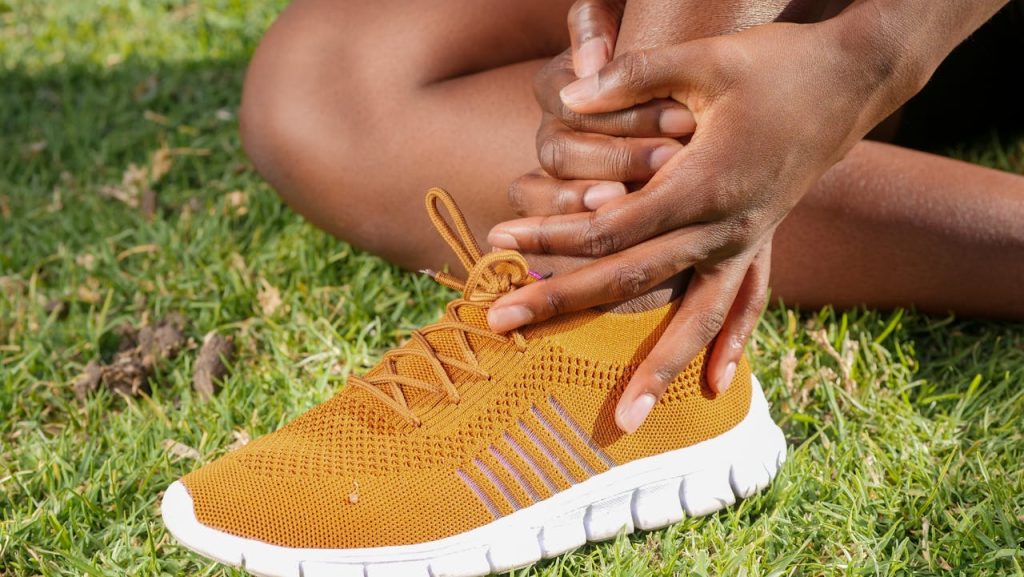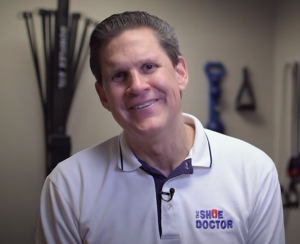You may have heard of plantar fasciitis and its symptoms, but do you know what causes this condition? Plantar fasciitis is an inflammation of the connective tissue on the bottom of your foot. The pain gets worse when walking or standing because it puts pressure on that area. The cause can be from a variety of things such as wearing improper footwear or running too much without giving your feet enough time to recover. In order to prevent plantar fasciitis from happening, it’s important to take care of your feet by getting proper shoes and avoiding activities that increase the chances of developing this painful condition.
What Are The Symptoms Of Plantar Fasciitis?
The most common symptom of plantar fasciitis is discomfort at the bottom of your heel or midfoot. It can affect one foot, but sometimes people also develop this condition in both feet if they’ve had it for an extended period and aren’t able to find relief from their pain quickly enough on just one leg without having more severe symptoms that require treatment like shooting pains going up into the ankle area.
From the toes to the bottom of the heel, the plantar fascia travels down the sole. Excessive pressure on this area of the foot might result in minor tissue tears. Inflammation, discomfort, and stiffness result from this injury.
Knowing what plantar fasciitis is and how to spot it, will help you:
- Understand what causes this condition and how to prevent it
- Explore early treatment options for yourself and your family to avoid bigger problems in the future
It’s possible that the discomfort will worsen with time. It can be especially bad after a period of rest, such as first thing in the morning or after long travel- which also means it could potentially get better just by taking advantage of the time to rest!
Alternatively, however; if you’re an active person who exercises often – then this condition may only get worse over your exercising sessions and throughout other times while activity levels are higher than what they typically would normally expect for most people going through daily life activities without any problems at all.
Keep in mind the following for faster recovery in case you’re suffering from plantar fasciitis:
- The discomfort can improve through rest
- If you’re an active person, the condition may worsen over time
- Taking it easy could be a good idea
What Are The Causes Of Plantar Fasciitis?
Plantar fasciitis is one of the most common causes of plantar blisters and heel pain. It can be caused by repetitive strain damage to your ligament on top, landing improperly, or walking too much with poor footwear which does not fit you properly.
Excessively jogging may also trigger this condition in some people due to their feet being forced into an unnatural position while running; meanwhile, reactive arthritis has been known often times cause these types of injuries as well because it damages cartilage around joints causing inflammation within them.
If you’re suffering from plantar fasciitis, make sure to visit a professional to:
- Get help to fix your foot problems
- Get relief from heel pain, arch pain, and heel spurs
- Use custom orthotics to solve your footwear problem
It’s not a good idea to play soccer or any other sport if you have plantar fasciitis, as it can make the pain worse. Additionally, women are more likely than men to get this condition and pregnant women often experience extreme bouts with their symptoms late into pregnancy due to increased strain on ligaments that support weight distribution during childbirth.
The average age of onset for Plantar Fasciitis is 40-70 but it may affect anyone at any time regardless of their gender or age unless they modify their exercise routine accordingly.
How to avoid suffering from this condition? Keep in mind the following:
- Women suffer from it more often than men through gaining weight from pregnancy.
- It can be prevented by modifying your exercise routine
- Stay active and healthy for longer periods of time
- Increase range of motion by protecting your tendons and muscles
Plantar fasciitis is a common condition that affects the feet, causing pain and inflammation. It can be caused by many different factors but typically develops as a result of overuse or injury to the plantar fascia ligament in your foot. If you are experiencing any symptoms such as heel pain when walking, morning stiffness in your arch, redness on the bottom of your toes, or soles of your feet, it could be plantar fasciitis! Call us today for an appointment so we can help diagnose and treat this painful condition before it worsens with time.
Remember, The 3 Arches of Your Feet Still Need Support!
Maybe you have already felt the first symptoms of balance disorders or you want to prevent them from appearing in the first place. Consider getting a foot orthotic device or simply take care of your feet. Start by washing them thoroughly with a gentle soap whenever you take a shower. Being a very complex support system, your feet are your first line of defense against balance-related issues, since their arches provide you with the stability you need in your daily life. It’s time to put your foot down and push back against balance issues. With both feet on the ground, dedicate yourself to keeping them comfortable and healthy. Give us a call and we will scan your feet to make you custom orthotic inserts.
The Shoe Doctor has specialized in providing custom orthotics for 20 years. The right orthotic insoles can greatly reduce foot, knee, and hip pain while increasing performance and comfort. Russell at The Shoe Doctor will help educate and assist you in finding the perfect solution for your particular situation. We will create a 3D map of your feet and make custom orthotics for your hiking boots, everyday shoes, and everything else in between. These orthotics, along with our expert advice, will get you using orthotics like a pro, and have you performing at the peak of your abilities in no time! If you are in the San Francisco Bay Area, give The Shoe Doctor a call to get the best custom orthotics in the area! We are here to assist you, schedule your free consultation here!


